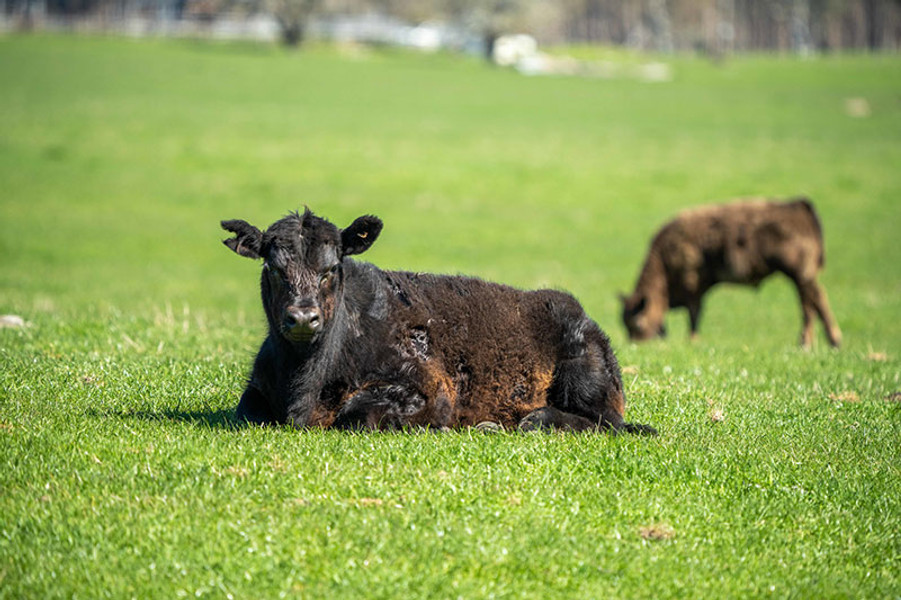Why Grass-Fed Beef is the Best Choice: Health, Sustainability, and Taste
Posted by Montana Ranch and Cattle on Oct 16, 2024
Choosing the right type of beef can significantly impact our health, the environment, and animal welfare. Grass-fed beef, which comes from cattle that have grazed on pasture throughout their lives, offers a multitude of benefits over conventionally raised, grain-fed beef. Understanding these benefits can help consumers make informed decisions that promote health, sustainability, and ethical farming practices.
Nutritional Benefits
Grass-fed beef is renowned for its superior nutritional profile. It is rich in Omega-3 fatty acids, which are essential for heart health and reducing inflammation. Additionally, grass-fed beef contains higher levels of Conjugated Linoleic Acid (CLA), a fatty acid that has been linked to cancer prevention and improved metabolic health. This type of beef is also packed with vitamins and minerals, including Vitamin E and beta-carotene, which contribute to overall wellness. Furthermore, grass-fed beef is typically lower in calories and unhealthy fats compared to grain-fed beef, making it a healthier choice for those looking to manage their weight and improve their diet.
Health Benefits
The health benefits of grass-fed beef extend beyond its nutritional content. Studies have shown that diets high in Omega-3 fatty acids can reduce the risk of heart disease, lower blood pressure, and decrease triglyceride levels. The CLA found in grass-fed beef has been associated with reduced cancer risk and improved immune function. Moreover, grass-fed beef's lower fat content and anti-inflammatory properties can aid in managing diabetes and other metabolic disorders. By choosing grass-fed beef, consumers can support their overall health and well-being.
Environmental Impact
Grass-fed beef is not only beneficial for human health but also for the environment. Sustainable farming practices associated with grass-fed cattle help reduce the carbon footprint and promote biodiversity. Unlike grain-fed cattle, which often require feed grown with synthetic fertilizers and pesticides, grass-fed cattle graze on natural pastures, contributing to healthier soil and ecosystems. This type of farming also supports carbon sequestration, which helps mitigate climate change. By choosing grass-fed beef, consumers can play a role in promoting environmentally friendly agricultural practices.
Animal Welfare
One of the significant advantages of grass-fed beef is the humane treatment of animals. Grass-fed cattle live a natural lifestyle, grazing on pastures and consuming a diet that aligns with their instincts. This approach avoids the use of antibiotics and hormones, which are commonly used in conventional farming to promote rapid growth. Ethical considerations are paramount in grass-fed farming, ensuring that animals are treated with respect and care throughout their lives. This humane treatment is not only better for the animals but also results in higher-quality meat for consumers.
Taste and Quality
Grass-fed beef is often praised for its superior taste and quality. The natural diet and lifestyle of grass-fed cattle contribute to a unique flavor profile that is often described as more robust and earthy compared to grain-fed beef. Additionally, the meat tends to be leaner and more tender, making it a favorite among chefs and home cooks alike. The culinary versatility of grass-fed beef allows it to be used in a wide range of dishes, from gourmet meals to everyday recipes. Consumer preferences are increasingly shifting towards grass-fed options, reflecting a growing appreciation for quality and flavor.
Economic Factors
While grass-fed beef may come with a higher price tag compared to grain-fed beef, its long-term benefits often outweigh the cost difference. The growing demand for grass-fed beef has increased its availability in markets, making it easier for consumers to find. Supporting grass-fed beef also means supporting local farmers and sustainable agricultural practices, which can have positive economic impacts on rural communities. Investing in grass-fed beef can be seen as a commitment to quality, health, and sustainability, offering long-term benefits that justify the initial cost.
Consumer Education
Educating consumers about grass-fed beef is crucial for promoting its benefits. Understanding labels and certifications can help consumers identify genuine grass-fed products and avoid misleading claims. Recognizing quality standards and making informed purchasing decisions can lead to better health outcomes and support for ethical farming practices. Promoting awareness about the advantages of grass-fed beef can drive demand and encourage more sustainable and humane farming methods.
Challenges and Misconceptions
Despite its many benefits, grass-fed beef faces several challenges and misconceptions. Common myths include the belief that grass-fed beef is always tough and less flavorful, which is not necessarily true. Production challenges, such as higher costs and the need for more land, can also be barriers for farmers. Addressing consumer skepticism through education and transparency is essential for overcoming these hurdles. Comparing grass-fed beef with grain-fed options can highlight its advantages and dispel common myths.
Case Studies and Testimonials
Real-life stories from consumers who have switched to grass-fed beef often highlight significant health improvements and satisfaction with the quality of the meat. Farmers who have adopted grass-fed practices share success stories of improved animal health, better environmental outcomes, and increased consumer demand. Health transformations, such as weight loss and better management of chronic diseases, are frequently reported by those who incorporate grass-fed beef into their diets. Expert opinions and endorsements further validate the benefits of grass-fed beef, providing a robust foundation for its advocacy.
In summary, grass-fed beef stands out as the best choice for its numerous health benefits, positive environmental impact, humane animal treatment, and superior taste and quality. By choosing grass-fed beef, consumers can make a positive difference in their health, support sustainable farming practices, and promote ethical treatment of animals. It is a worthwhile investment that offers long-term benefits and aligns with values of health, sustainability, and ethics. For those looking to make a meaningful change, switching to grass-fed beef is a powerful step towards a better future.

